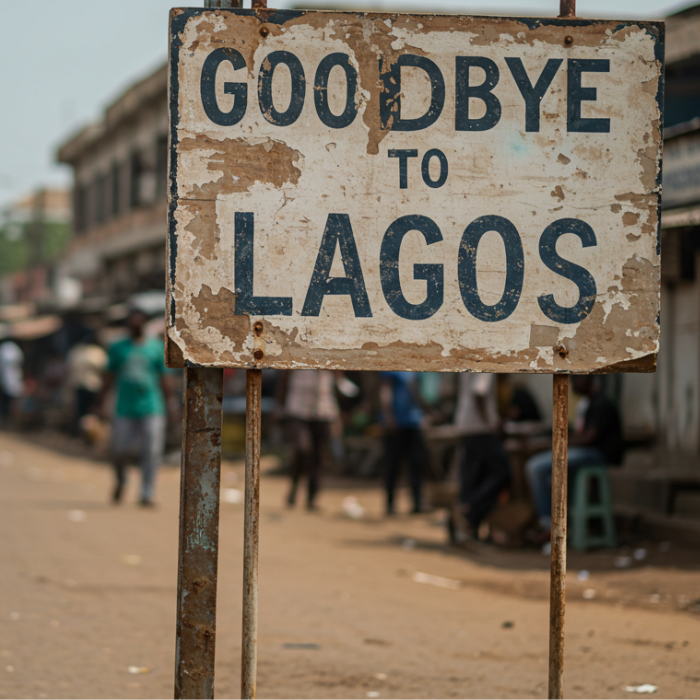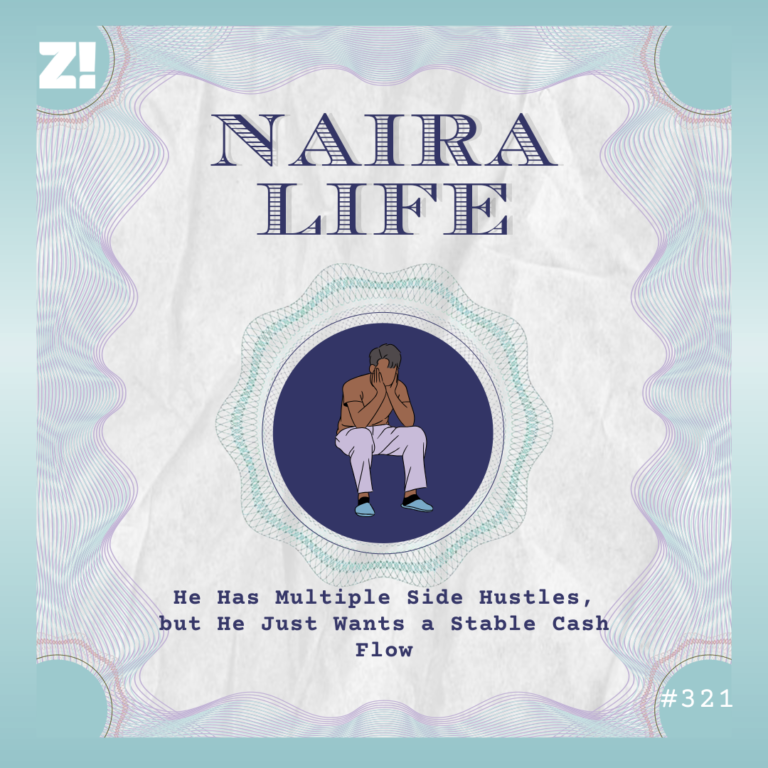When you think about the cost of running a business in Nigeria, the financials come to mind first. But there are grave mental costs too, and Olayinka Ahmed (co-owner and manager of Citi Lounge) only realised this weeks after starting his restaurant.
He talks about building the restaurant from scratch, why he believes everyone is out to defraud him and how much the business has changed him in little time. According to him, he’s “lost his humanity”.
As told to Boluwatife
Image designed by Freepik
Nothing prepares you for the reality of running a restaurant in Nigeria, especially if you have zero business experience like me.
I was a freelance influencer and had never held a 9-5 before setting up and co-managing Citi Lounge — a restaurant and lounge on the Lagos Mainland — in November 2023. I’ve been at it for about three weeks, and my learnings could fill a book.
The first thing you need to know when setting up a similar business in Lagos is that you’ll need a lot of money. Money influenced the idea of owning a lounge in the first place. My friends, Joshua, Chidi, and I were more versed in the digital marketing space, but we saw an opportunity to make money with the lounge and thought, “Why not?”
We kicked off our plans in September 2022. Once we decided we were going forward with the idea, land was the next thing to cross off the set-up list. This is where money comes in. We found a spot in Surulere and took out a 10-year guaranteed lease.
The government approvals and building construction came next. Lagos State takes these approvals seriously, so you can expect multiple supervisions from agencies like LASEPA, a million documentation, and several accreditations if you ever consider setting up a lounge. This cost between ₦100k – ₦200k. It is a tedious but necessary process.
We eventually got approval to start building in March 2023. Of course, we had to deal with the area boys who didn’t allow us to build — even after government approval — until we met with their leaders and settled them. That cost a couple of millions. After we paid, they gave us a timeline to complete building or risk settling them again. We met the timeline and kicked off operations in November.
When running a restaurant business, it’s important you get adequate technical support and training from a kitchen and operations consultant. Things like getting the restaurant to have a uniform taste and portion size and other processes don’t just happen by chance. We knew how it worked, but we still had a few glitches during the launch.
A week before the official launch, we decided to do a friends-only opening to get feedback and tweak our processes as necessary. We planned for 100 people, but the invitees must have thought it was a bigger event because 600 people turned up.
RELATED: How To (Successfully) Gatecrash An Owambe In Nigeria
Our waiters were overwhelmed and were all over the place, so many people left without paying. Maybe the invite should’ve specified that it wasn’t a “free” launch, but I expected people to know to pay for their drinks as a way to support a new business. Out of eight bottles of Glenfiddich we sold that day, we could only account for three payments. Each bottle sold at ₦92k. In total, we lost at least ₦5 million in unpaid bills that day.
The official launch wasn’t much better. We had extra temporary waiters, but the turnout exceeded expectations. I didn’t know we were supposed to have runners — people who assist waiters with sending and delivering food orders to the kitchen so the waiters don’t leave the main area. Since the distance between the lounge and the kitchen is quite small, we figured one person could do it. Ideally, one person can do it, but it’s a challenge during peak periods when a waiter is also trying to attend to and get other customers’ orders to the kitchen. The biggest problem here is that people can easily slip out without paying, and that’s what happened to us.
Thankfully, we’re past that now. Did I mention the tax payments? It’s a whole new world, and you’ll definitely need an accountant.
In Lagos, you must pay 12.5% tax on every revenue you make: 5% consumption tax and 7.5% VAT. No one tells you this before starting. The crazy thing is I can’t directly charge this to customers. We’re in Surulere; If someone knows a bottle of beer costs ₦1k somewhere else, why would they pay ₦125 extra for the same thing? So, we have to pay that off from whatever we make, not counting product loss or theft.
Speaking of theft, never forget that everyone — especially your staff — is out to defraud you. I hired someone who had been begging for a job four months before we started. He’d come to the site and practically do work as a labourer, so he’d be part of those we’d employ when we started operations. He was also very religious, so I thought I was lucky to find a God-fearing, hardworking man.
One week into employment, we caught him stealing a massive chunk of raw meat. We’d just installed a CCTV system, and surprise surprise, he was seen hiding the meat in the bin so he’d come back for it. What’s funnier is that another staff saw the meat and kept it aside, but he went and took it again.
Immediately after watching the video, my manager called all the staff together to beg them not to steal. She begged for nearly two hours and was close to tears before she was done. She also called out the meat thief in everyone’s presence. You won’t believe that after that talk, we caught yet another staff hiding multiple pieces of asun under pasta. You can’t even blame it on hunger because we give them lunch, and even a lion didn’t need that much asun. It’s just sad.
Vendors aren’t left out, too. The other day, we ran out of beer and called our direct contact at the breweries. They didn’t have what we needed, so I decided to buy from a retailer nearby. The retailer’s price was only ₦100 more than what my wholesale contact charged, which shouldn’t be the case since wholesale is meant to be far cheaper.
Curious, I asked the retailer how much he sold empty bottles, and he charged ₦1k per crate. This was the same thing my wholesaler sold to us for ₦5,400. We’d bought 85 crates from him, meaning he’d overcharged us by a whopping ₦4,400 per crate. I’m sure if I’d negotiated with the retailer, he’d have sold it for less than ₦1k. I emailed the breweries to complain, but I know I won’t get my money back. The best they’ll do is sack the wholesaler.
I’m a different person than I was a few weeks ago. Now, I know why it’s important to talk to people in this industry. The wholesaler could cheat us because he knew we were new to the business. It won’t happen again; I now know to seek several opinions and check several prices before buying anything.
I’ve also lost a huge part of my humanity. I can’t stand to see people hurt or turn a deaf ear to pleas, but I’ve realised that people are out to ruin the business. Remember the meat thief? I was advised to sack and arrest him, but he showed remorse, and I decided to give him another chance. A few days later, he started acting up again, threatening to leave the business, and I had to have him escorted out. He responded by rolling on the floor and begging to stay. It broke me, but I knew he wasn’t actually remorseful.
Running this business has also made me more analytical. I used to believe in the universe making things work for me, but the business will pack up in days if I wait for the universe now. I have to be on the ground, keeping an eagle eye on everything. If it’s not food theft, it’s waiters claiming some customers didn’t pay so they can keep the money. I hardly have time for my family or other work interests now, and it’ll probably be like this for the next six months. I hope by then, we’ll have established a culture and strict processes to ensure the lounge runs at minimal loss without my daily input.
It hasn’t been all terrible, though. I recently started sharing some of these experiences on Twitter, and people have been really supportive. We’ve had people visit the lounge just because they saw my posts and wanted to show support. Patronage has been up by 500%, and it’s a significant testament to the fact that while there may be many terrible people, there are equally as many good people out there. It’s what keeps me going.
NEXT READ: It’s Taken Us Three Years [and Counting] to Access My Late Aunt’s Pension




